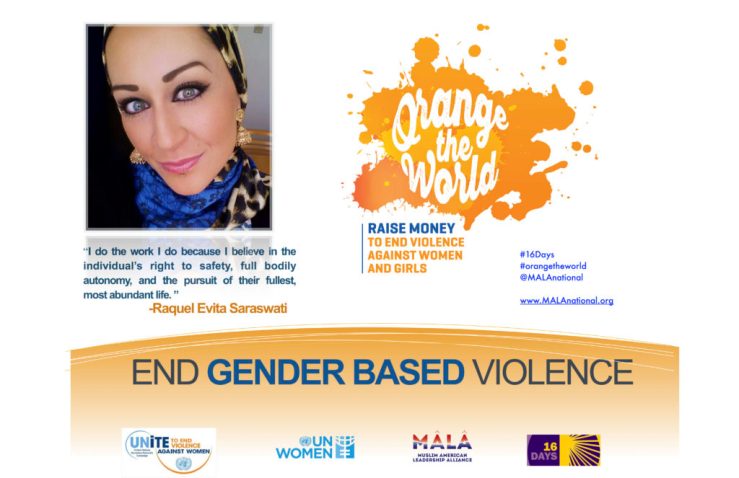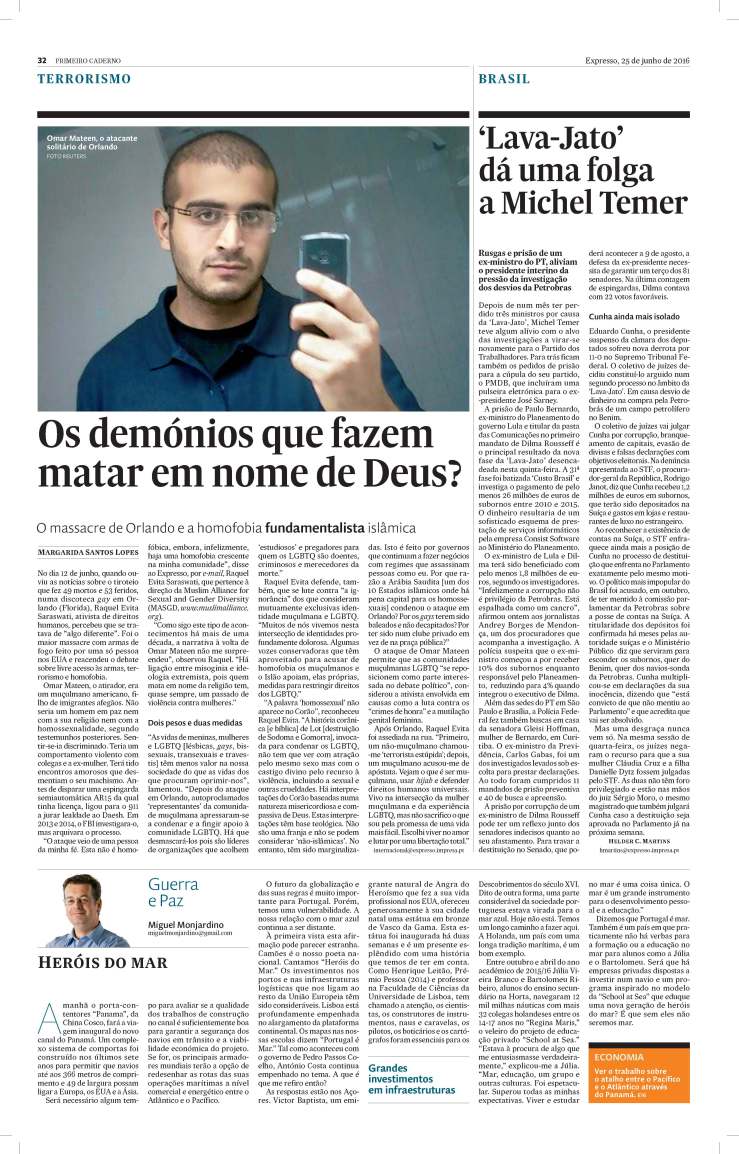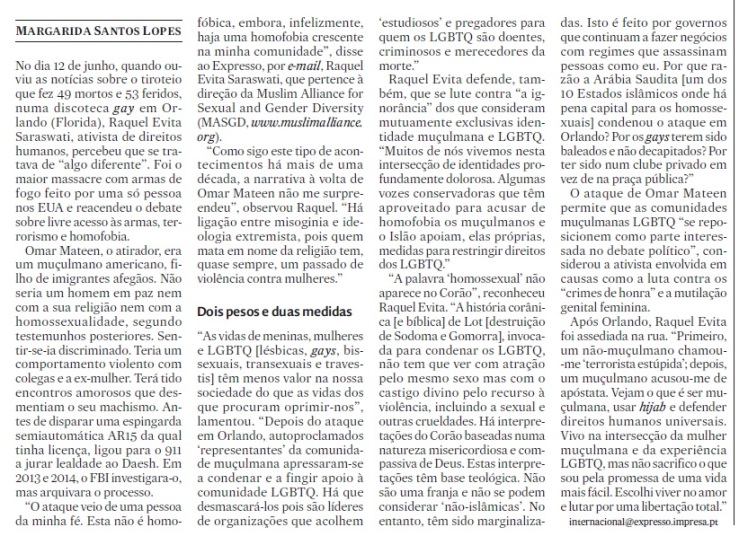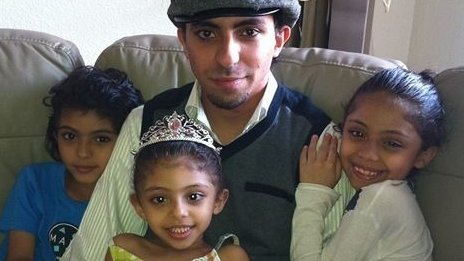Click here for the original article.
By Elizabeth Whitman
The Twitter account Garrett Fugate created under the pseudonym Hanif Kiriakos in September 2012 gave him the chance to finally speak freely and openly about his frustrations. Reassured by an online safe haven that included Muslims like him, Fugate, then a 24-year-old college student, began the process, little by little, of coming out as gay.
First, Fugate told his local lesbian, gay, bisexual, transgender and queer (LGBTQ) group. Next, he told his family, whose members were very accepting. And then, he told his roommate. A year passed before he had the hardest conversation of all, with his close-knit group of Muslim friends. The news spread with shocking speed through the local mosque in Lawrence, Kansas, where he lived. Soon, some members responded with stony silences when Fugate offered the standard Islamic greeting of peace, “Assalamu alaikum.”
Fugate’s experiences and those of other LGBTQ Muslims were catapulted into the public spotlight this week after reports that Omar Mateen, an American Muslim who allegedly killed 49 people at a gay nightclub in Orlando, Florida, Sunday, might have been gay himself. Prompted by one of the worst mass shootings in U.S. history, this sudden scrutiny both bolsters and imperils recent, painstaking progress by LGBTQ Muslims to gain recognition and acceptance by their communities and the broader American public.
“Right now, we’re at this very difficult and painful nexus in American and global history,” said Raquel Evita Saraswati, an American and Muslim on the steering committee of the Muslim Alliance for Sexual and Gender Diversity (MASGD). Since the Sept. 11, 2001, terrorist attacks on the U.S., LGBTQ Muslims have found themselves grappling with thorny questions of political identity, instead of focusing primarily on shoring up emotional or theological support for their community while countering anti-Muslim and anti-LGBTQ bigotry, Saraswati said.
With the mass shooting in Orlando, “now you have a terrorist to talk about,” Saraswati said.
The motives of Mateen, the alleged shooter who was slain by police, are unclear, but, in the midst of the carnage, he called 911 and declared his allegiance to the Islamic State group, as he also reportedly did in a Facebook message posted before the rampage got under way. Meanwhile, Mateen’s father suggested that hatred of gays inspired the attack, even though Mateen himself may have been gay or bisexual.
The mass shooting highlighted how, in a country where homophobia is alive and well — almost 21 percentof about 6,000 hate crimes in 2013 were associated with sexual orientation — the LGBTQ community remains a target. And the religion of the alleged killer left Muslims once again defending their faith from being painted as the source of such violent extremism, even while fearing potential backlash.
In the U.S., to be either LGBTQ or Muslim is to be a member of a minority group that regularly faces discrimination. To be both is to exist even further on the margins.
“I’ve actually never met an openly gay Muslim,” said Jim Sues, executive director of the New Jersey branch of the Council on American-Islamic Relations.
Many Muslim societies reject homosexuality for reasons of culture, religion or both, even though the question about what Islam actually says about homosexuality has no single answer. With the Sunni sect alone having four schools of jurisprudence, Islam is not monolithic, and even the term homosexuality encompasses a spectrum of behaviors, feelings and identities. Still, those who identify as queer risk being shunned by families or communities that hold on to traditional views, including those in the U.S.
In response, various organizations have striven for decades to foster solidarity and support among LGBTQ Muslims.
For example, the Lavender Crescent Society served queer Muslims in San Francisco in the late 1970s. Al-Fatiha Foundation originated as a listserv in 1997, but quickly blossomed into a full-fledged support group, hosting events and providing other resources to LGBTQ Muslims. It disbanded in 2008, but not before amassing 800 members across four countries.
In 2013, MASGD took up Al-Fatiha’s national mantle. Every May, it holds a retreat in the Philadelphia area, at a location that it does not publicize for security reasons. Meanwhile, local groups such as the Queer Muslims of Boston organize gatherings, prayers and readings, as well as iftars, meals to break the Ramadan fast.
By now, these groups have learned to operate carefully, out of caution not just for personal security but also to protect members who otherwise remain closeted.
With so much at stake, the locations of events for LGBTQ Muslims are frequently kept under wraps, Saraswati said. When Al-Fatiha hosted a retreat about a decade ago, she recalled, some attendees were afraid that the event was not initiated by other LGBTQ Muslims, but in fact by extremists bent on killing them.
Such fears were not unfounded. In 2000, the group almost canceled a retreat in London after a conservative Muslim group issued a threat.
But at the most recent MASGD retreat in May, attendees felt safe, as if they knew they were with family, Saraswati said, adding, “That’s a pretty remarkable shift.”
The internet has been central to these precious gains, from the early years of the Al-Fatiha listserv to the current private Facebook groups and other online initiatives, such as a Tumblr showcasing photographs of queer Muslims.
“A lot of the support networks for me — and a lot of queer Muslims — are online. That’s how a lot of us find each other,” said Fugate, who is now 28 and seeking a doctorate in Islamic studies at Boston University. “So many of us are closeted in our own communities,” he said.
However, the massacre Sunday shone a light on this community that has long hidden in plain sight. This invisibility has served to protect its members, but it does not necessarily help facilitate recognition or foster tolerance and acceptance.“I’ve actually never met an openly gay Muslim,” said Jim Sues, executive director of the New Jersey branch of the Council on American-Islamic Relations, a Muslim advocacy group.
As Fawzia Mirza, a child of Pakistani parents, explained it, “You have never met a queer Muslim — that you know of.”
When Mirza was first grappling with reconciling her identities as a queer Muslim, she initially felt she would have to sacrifice one or the other. “They don’t always necessarily play nice with each other,” she said of being LGBTQ and Muslim.
For her and for others, the fear of stigma and rejection can inhibit a willingness to come out to family, friends and the Muslim community at large. But Mirza also encountered questions from the broader LGBTQ community and sensed that there, too, she was different.
“When I was first going to gay bars, people wanted to know where my name was from, what it meant,” Mirza said. “So many people in the gay community had never met a gay Pakistani or a gay Muslim before.”
Mirza, an actor, producer and writer in Chicago whose work very publicly tackles very private questions of identity, eventually came out to her mother through the Google instant-messaging service some call Gchat.
She was fresh out of a breakup, sitting in an airport and feeling wretchedly alone and sad. So she told her mother about the relationship. “You’re so broken, and you just want unconditional love,” Mirza said, describing herself.
Her mother was shocked, Mirza recalled. For a while, they stopped talking. Even after many years and conversations, they still don’t see eye to eye — what mothers and daughters do? Mirza asked — although now they speak regularly, and Mirza said she is “living openly and authentically in a way I feel very good about.”
Fugate, at Boston University, said he felt privileged because, as a convert to Islam, he did not have family ties to one particular mosque or Muslim community. Yet since moving from Lawrence to Boston last year, he has kept quiet about his sexuality, at least at his local mosque.
“It’s like a don’t-ask-don’t-tell policy,” he said. After he came out in Kansas, he lost the Muslim community there. In Massachusetts, he was not so much afraid that he would be ostracized. Rather, he was focused on being part of the other community of other queer Muslims he has worked so hard to find, online and off.
As a student, Fugate focuses on gender issues and sexuality in Islam, a religion built on centuries of scholarly interpretation and reinterpretation of the Quran and other texts. He mentioned at least one modern-day scholar who has already begun tackling theological questions about homosexuality’s place in Islam.
For Fugate, such study fuels hopes that perceived conflicts between being gay and Muslim might someday be fully reconciled.
“Sometimes, I feel like it’s a contradiction. In other ways, I don’t,” he said, before repeating, quietly, “It’s just who I am.”









